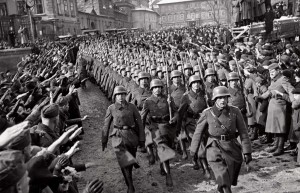
One of the most foundational causes of World War II was the German occupation of Czechoslovakia. The occupation was a result of Hitler’s aggression and the passive compromise of the Western Allies (namely Great Britain and France). Hitler claimed the region of Sudetenland, based on language and ethnicity arguments. The majority of the population of the Sudetenland was German-speaking and this was Hitler’s justification for taking the Sudetenland. The Western Allies believed that if Hitler was granted Sudetenland he would stop his land-grab. Germany had been rising from the ashes of the First World War, slowly but surely. They had militarized the Rhineland, a forbidden act. They had hosted the 1936 Summer Olympic Games and had used this opportunity to show the world that the old German regime had been reborn. In 1938, Vienna and Berlin were united in another forbidden act of “Anschluss” (Union). The Munich Agreement was brokered by the leaders of Great Britain, France, Germany and Italy. The British Prime Minister, Neville Chamberlain, is remembered as the “face” of “appeasement”. Appeasement was the model of allowing Hitler to take what he wanted and wishfully believing that this would stop his aggression. As we all know, appeasement didn’t work. After the Sudetenland, Hitler desired all of Czechoslovakia. This was given him. When the German army invaded Poland, war broke out.
Sadly and unnervingly, we face a disturbingly similar situation in our own day. The story of a nation rising from the ashes of a destroyed empire, regaining strength, declaring to the world this resurrection and then becoming involved in a somewhat welcoming region of a free country, hostile to them, is upon us again. You probably have guessed what I am talking about. If not, let me explain.
In 2010, Viktor Yanukovych was elected President of Ukraine. He desired a closer relationship with Russia. His country was divided. Many people in the Western region of the nation wanted closer ties with the European Union. Many in the East wanted closer ties with Russia. When Yanukovych started policies which attempted to move the nation into a more intimate relationship with Russia, protests began. In mid February 2014, thousands of protesters congregated in Kiev’s Independence Square. Riot police fired on them and Ukraine found itself in turmoil, on the brink of civil war. Yanukovych declared that the protesters were rebels attempting to overthrow him. He fled Kiev and wound up in Russia. Meanwhile, the Russian-sympathetic region of Crimea staged their own mini-revolution. They raised the Russian flag over Ukrainian government buildings in the Crimea. On March 1, Russian president Vladimir Putin and the Russian legislature ordered troops to intervene and “protect Russian interests” in the Crimea. Unidentified soldiers in Russian army vehicles rolled into Ukrainian territory.
The similarities between the occupation of Czechoslovakia and the situation in Ukraine are disturbing. Let me make one thing clear, I am not comparing Russia with Nazi Germany nor am I comparing Putin with Hitler. I am simply pointing out that the general story is the same and some of the elements are very similar. (For example, the 1936 Summer Olympic Games being held in Germany and the 2014 Winter Olympic Games being held in Sochi, Russia.) The story starts with territorial expansion of a resurrected empire. We must also realize that just as parts of Czechoslovakia had been under German control prior to 1918, the nation of Ukraine was under Russian/Soviet control since the late middle ages. The story progresses to the division of a nation. The people of Sudetenland and the Crimea were/are the minority in their respective nations.
Just as Hitler did not stop with Sudetenland, it is quite probable to say that Putin will not stop with the Crimea. Appeasement has not worked historically. That must be understood. I do not condone war with Russia, all I am arguing for is a non-appeasing policy in the Ukrainian situation.
